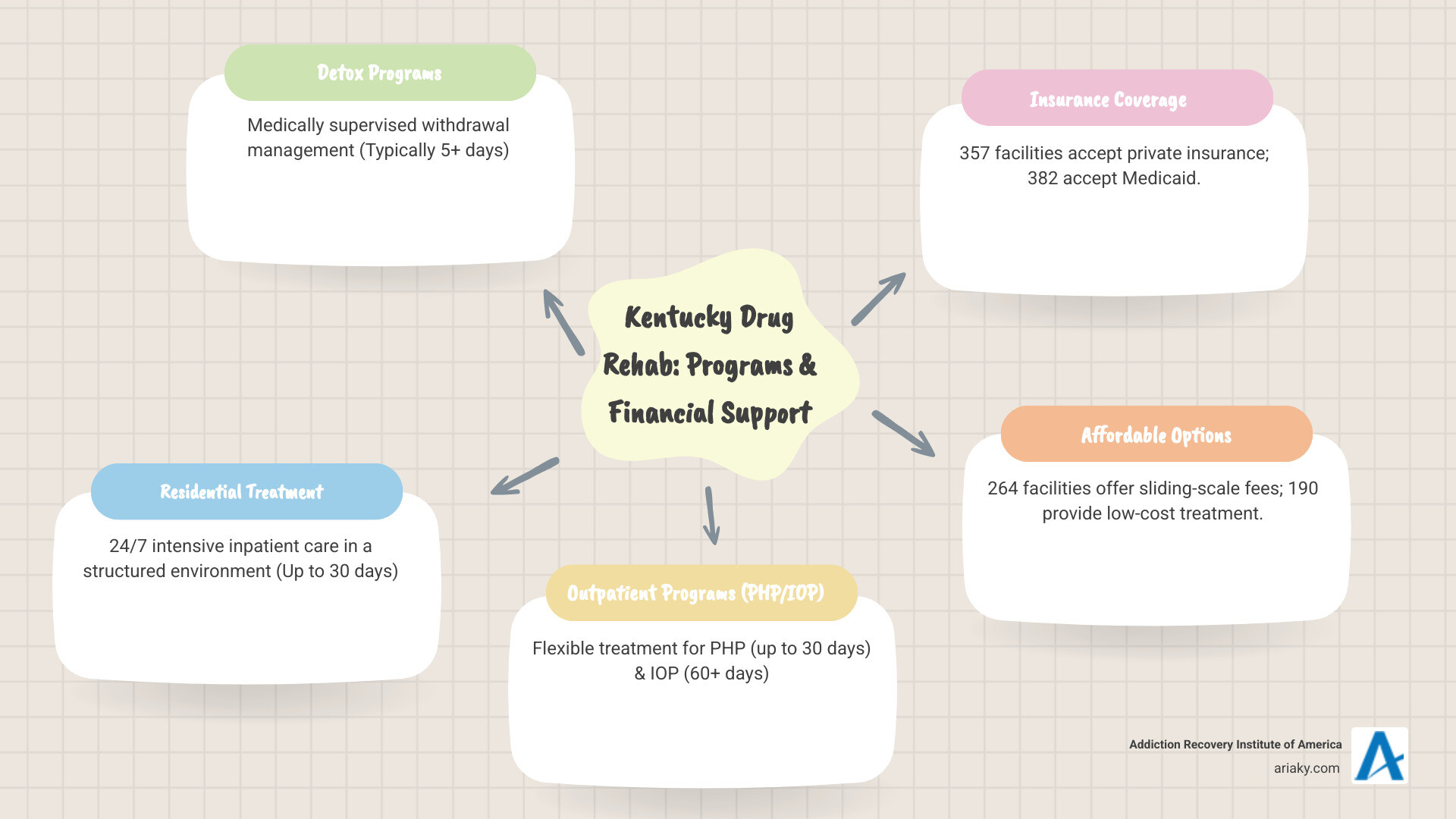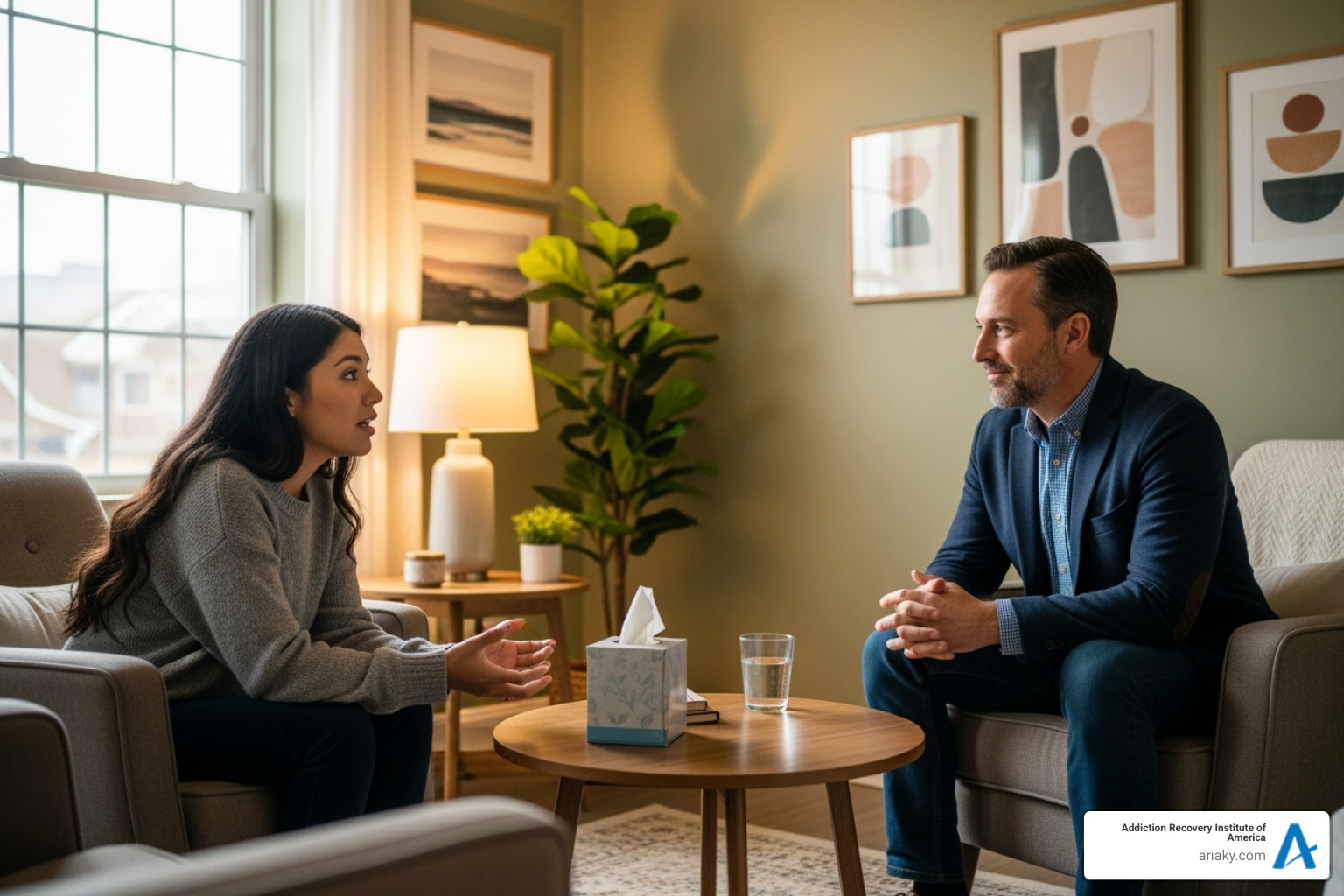Finding Hope and Healing in the Bluegrass State
Drug rehab Kentucky options are available across the state to help you or a loved one break free from addiction. With over 530 drug rehab facilities in Kentucky, finding the right program can feel overwhelming, but help is within reach.
Quick Answer for Kentucky Drug Rehab:
- Detox Programs: 5+ days of medically supervised withdrawal management
- Residential Treatment: Up to 30 days of 24/7 intensive care
- Partial Hospitalization (PHP): Up to 30 days of structured daily treatment
- Intensive Outpatient (IOP): 60+ days of flexible recovery support
- Insurance Coverage: 357 facilities accept private insurance, 382 accept Medicaid
- Cost Options: 264 facilities offer sliding-scale fees, 190 provide low-cost treatment
Kentucky faces significant addiction challenges. For instance, over 28,370 school behavior incidents involved substances during the 2022-2023 school year, reflecting a crisis affecting families across the Commonwealth.
But there’s hope. Kentucky’s treatment centers combine evidence-based practices with compassionate care, offering specialized programs for various substances, co-occurring disorders, and specific populations.
Recovery is possible. As one person shared, “I just let God write it. And it’s truly been a symphony.” Whether you need medical detox or long-term care, Kentucky’s rehabs provide pathways to sobriety.
The key is finding the right fit for your unique needs. This means understanding different levels of care, verifying insurance, and choosing an accredited facility with proven treatment approaches.

Recognizing the Signs: When to Seek Help for Addiction
Recognizing the need for a drug rehab Kentucky program is often the hardest step. Addiction can creep in slowly, disguised as stress relief, before becoming a serious problem. If you suspect something is wrong, trust your instinct. Recognizing these signs isn’t about blame; it’s about finding help that can change everything.
Here are common signs to watch for:
Physical changes: Noticeable physical changes can include sudden weight fluctuations, poor hygiene, dilated or constricted pupils, frequent nosebleeds, or tremors. Energy levels may swing from exhaustion to hyperactivity.
Behavioral shifts: Behavioral shifts often involve secrecy, frequent lying, and sudden mood swings. A decline in work or school performance and a loss of interest in previous hobbies are also common.
Psychological symptoms: Psychological symptoms include unexplained anxiety, depression, and memory problems. Obsessive thoughts about the substance, along with guilt and shame, are also telling signs.
Social and work problems: Social and work problems often follow, such as strained relationships, isolation, legal issues, and financial trouble due to spending on substances. Maintaining employment becomes difficult.
Loss of control: A key sign is a loss of control, where attempts to quit or cut back fail despite negative consequences. This indicates a need for professional help.
Increased tolerance: Increased tolerance, or needing more of the substance to achieve the same effect, is a clear warning sign of worsening addiction.
Withdrawal symptoms: Withdrawal symptoms like nausea, aches, severe anxiety, or even seizures occur when the substance is unavailable. This creates a cycle that’s difficult to break without help.
If several of these signs sound familiar, it’s time to consider professional help. Addiction is a medical condition that responds well to proper treatment. Understanding these patterns is the first step toward recovery, and recognizing the need for help is where healing begins.
More info about Substance Abuse Topics
Navigating the Landscape of Drug Rehab Kentucky Programs
Choosing the right drug rehab Kentucky program is crucial, as everyone’s journey is unique. With over 530 facilities, Kentucky offers different levels of care to fit your specific needs. Think of treatment as a ladder; you can start at the level of support you require and move between levels as your needs evolve.
| Feature | Inpatient/Residential Treatment | Outpatient Treatment (IOP/PHP) |
|---|---|---|
| Environment | 24/7 supervised, structured living at a facility | Clients live at home, attend scheduled sessions at a facility |
| Intensity | High – immersive therapy, medical supervision | Moderate to High – structured therapy, less intensive supervision |
| Duration | Typically shorter (e.g., up to 30 days) | Often longer (e.g., 60+ days for IOP, up to 30 days for PHP) |
| Support | Constant access to medical and therapeutic staff | Regular access to therapeutic staff, strong peer support |
| Flexibility | Limited – focus is entirely on recovery | High – allows continuation of work, school, family responsibilities |
| Suitability | Severe addiction, unstable home environment, complex co-occurring issues | Moderate addiction, stable home environment, step-down from inpatient |
| Focus | Foundation building, medical stabilization, intensive therapy | Skill building, relapse prevention, reintegration into daily life |
Your individual needs determine the best path. Severe addiction may require intensive inpatient care, while outpatient programs offer flexibility for those with work or family commitments.
More info about Inpatient vs Outpatient
Medically-Supervised Detox
Medically-supervised detox is often the first step in recovery. Withdrawal can be uncomfortable and even dangerous, so medical professionals monitor you and provide medication to ensure your safety and manage symptoms. You’ll receive 24/7 medical care from a team that understands withdrawal. We offer specialized programs for different substances:
Alcohol Detox Program KY helps manage the potentially life-threatening symptoms of alcohol withdrawal. Opiate Detox Program addresses the intense challenges of opioid withdrawal. Meth Detox Program focuses on the unique needs of methamphetamine withdrawal.
Inpatient and Residential Treatment
After detox, residential treatment provides a solid foundation for recovery. Living at the facility allows you to focus completely on healing, free from outside triggers. This immersive, 24/7 supportive environment offers intensive, structured programming for up to 30 days. It’s a chance to make recovery your full-time job with a dedicated team helping you succeed.
Residential Treatment Program KY
Outpatient Treatment Options
Outpatient programs offer the flexibility to heal while managing daily responsibilities like work or family. They are ideal for those who don’t require 24/7 supervision or are stepping down from residential treatment. The advantage of outpatient care is applying recovery skills in your real-world environment from day one.
Outpatient Treatment Program KY offers regular therapy sessions and support groups that fit around your schedule.
Intensive Outpatient Program (IOP) Kentucky is a step up, with more frequent sessions over 60+ days. It’s an excellent bridge from residential treatment back to independent living.
Partial Hospitalization Programs (PHP) are the most intensive outpatient option, offering up to 30 days of comprehensive daily programming while you return home each evening. This is ideal for those who need serious support but have a stable home environment.
The Cost of Recovery: Paying for Treatment in Kentucky
The financial side of drug rehab Kentucky can feel overwhelming, but don’t let cost delay your recovery. It’s one of the most important investments you’ll make, and many payment options are available.

Kentucky ranks 34th nationwide for treatment affordability. Costs vary by program type—for example, medical detox costs more than outpatient counseling. The most important thing to know is that you don’t have to figure this out alone.
How to Pay for Drug Rehab in Kentucky
At ARIA, our mission is to remove financial barriers to treatment. We explore every payment option with you because we believe everyone deserves a chance at recovery. Here are the primary ways to pay:
Private health insurance is a common starting point. Most plans include addiction treatment benefits. In Kentucky, 357 rehab facilities accept private insurance. We work with major providers like Aetna Insurance, Blue Cross Blue Shield, and Cigna. Our team will verify your benefits and explain your coverage.
Medicaid coverage is a lifeline for many, often covering treatment at little to no cost. With 382 facilities accepting Medicaid in Kentucky, you have plenty of options for quality care.
State-funded insurance programs provide additional support, with 225 facilities accepting this type of coverage.
If you don’t have insurance, sliding-scale fees are available at 264 facilities. These adjust the cost of treatment based on your income and ability to pay.
Private pay is accepted at 447 facilities, often with payment plans to spread out the cost.
Additionally, 190 facilities in Kentucky offer free or low-cost treatment, and 14 accept tribal funding for members of tribal communities.
The bottom line is that we will work with you to find a way to make treatment happen. Our admissions team understands insurance, financial aid, and payment options, and they will help you steer your choices.
More info about Paying for Treatment
Specialized Therapies and Holistic Healing in Kentucky
True recovery goes beyond simply stopping substance use. The most effective drug rehab Kentucky centers recognize that addiction affects your mind, body, and relationships. That’s why leading facilities use a comprehensive approach that treats the whole person, not just the addiction.

Because every journey is unique, personalized care is crucial. Your treatment plan should reflect your individual history, challenges, and goals. This approach is built on a foundation of evidence-based practices—therapies scientifically proven to be effective for lasting recovery.
Evidence-based practices in addiction treatment
Evidence-Based Therapeutic Approaches
Top rehab centers use research-backed methods to help you understand addiction, develop coping skills, and build tools for long-term sobriety.
Cognitive Behavioral Therapy (CBT) helps you identify and change the negative thought patterns and behaviors that fuel substance use. It provides a roadmap for handling triggers and stress in healthier ways.
Cognitive Behavioral Therapy Program
Dialectical Behavior Therapy (DBT) is especially helpful for those with intense emotions. It teaches key skills like mindfulness, emotional regulation, distress tolerance, and interpersonal effectiveness.
Dialectical Behavior Therapy Program
Individual therapy offers a safe, one-on-one space with a therapist to explore the root causes of your addiction, including trauma or other personal issues.
Individual Therapy Program
Group therapy reduces isolation by connecting you with others who understand your struggle. It’s a powerful way to gain new perspectives and build a sense of community.
Addressing Co-Occurring Disorders and Trauma
Addiction rarely exists in a vacuum. It often co-occurs with mental health conditions like depression, anxiety, or PTSD. This is known as a dual diagnosis, and it requires integrated treatment that addresses both conditions simultaneously.
Trauma is also a common underlying factor, as many people use substances to numb the pain of past experiences. Specialized trauma therapy is essential for healing and preventing relapse.
Trauma Related Addiction Program KY
Research shows that holistic continuing care, which addresses your physical, emotional, and spiritual well-being, leads to better long-term outcomes.
A holistic perspective on continuing care
Integrating Family and Community Support
Addiction impacts the entire family. The best rehab programs include your loved ones in the healing process through family involvement.
Family therapy provides a safe space to heal relationships, improve communication, and learn how to support recovery.
Family Therapy Program KY
Building a strong support system is key to long-term sobriety. This includes connecting with peers in recovery, participating in support groups, and joining alumni programs. These relationships provide ongoing encouragement and accountability.
Finding Help: Kentucky State Resources and Support
Finding a reputable drug rehab Kentucky center that fits your needs can feel overwhelming, but you don’t have to do it alone. Kentucky offers state initiatives, hotlines, and community programs to connect residents with treatment. Understanding how to access quality care is the first step.

One thing is constant in the search for treatment: accreditation matters. Look for facilities recognized by respected organizations like The Joint Commission. Accreditation ensures a center meets rigorous safety and quality standards, demonstrating a commitment to excellence.
The Joint Commission provider locator
How to Find a Reputable Drug Rehab in Kentucky
Choosing the right treatment center is a critical decision. Here’s how to evaluate your options:
- Check accreditation and licensing. A legitimate center must be licensed by Kentucky and ideally accredited by a national body like The Joint Commission or CARF. ARIA Kentucky holds both, reflecting our commitment to quality.
- Ask about the treatment approach. Ensure they use evidence-based practices like CBT or DBT and can tailor programs to individual needs.
- Look for a full continuum of care. A facility offering detox, residential, PHP, and IOP allows you to move between levels of care as your needs change.
- Evaluate staff qualifications. Therapists and medical staff should be licensed and have specialized training in addiction and co-occurring disorders.
- Inquire about aftercare support. Strong aftercare, like alumni programs and support groups, is crucial for long-term recovery.
- Find specialized programs. If you need dual diagnosis treatment, trauma-focused therapy, or gender-specific care, ensure the center has expertise in those areas.
- Clarify financial options. Ask about accepted insurance, sliding-scale fees, and payment plans upfront to reduce financial stress.
- Consider family involvement. If family healing is important, look for centers with family therapy programs.
- Trust your instincts. The environment should feel safe, supportive, and welcoming. If possible, take a tour.
A reputable drug rehab Kentucky center will welcome your questions. Taking the time to choose wisely ensures you find a place that not only meets clinical standards but also feels right for you.
Conclusion: Your Path to a Brighter Future Starts Today
The road to recovery from addiction isn’t always easy, but it’s absolutely worth every step. If you’re reading this and struggling with substance use in Kentucky, know that drug rehab Kentucky programs aren’t just about treatment – they’re about change and hope for a completely different life.
Recovery is possible. We’ve seen it happen countless times. People who felt hopeless, who thought they’d lost everything, have found their way back to health, happiness, and meaningful relationships. The statistics we shared earlier about Kentucky’s challenges with addiction? Those same communities are also home to incredible recovery stories.
Taking the first step is often the scariest part. It takes real courage to admit you need help and reach out for support. But here’s the thing – you don’t have to figure this out alone. With more than 530 treatment facilities across Kentucky, there’s a program designed specifically for your unique situation and needs.
Whether you need medically-supervised detox to safely manage withdrawal, residential treatment for intensive healing, or outpatient programs that let you maintain work and family responsibilities, the right path exists for you. The key is finding a program that treats you as a whole person, not just your addiction.
At Addiction Recovery Institute of America (ARIA), we understand that lasting sobriety comes from addressing every part of your life – your physical health, mental wellbeing, relationships, and personal goals. Our accredited and AODE-certified programs combine proven treatments with genuine compassion. We’ve helped people from all walks of life refind who they really are beneath their addiction.
Your brighter future doesn’t start tomorrow or next week. It starts the moment you decide you’re ready for change. We’re here to walk alongside you every step of the way, celebrating your victories and supporting you through challenges.
Ready to take that first step? We’re ready to help.
Begin your journey at a Kentucky substance abuse treatment center

